By Nick Butler
Tags: Other
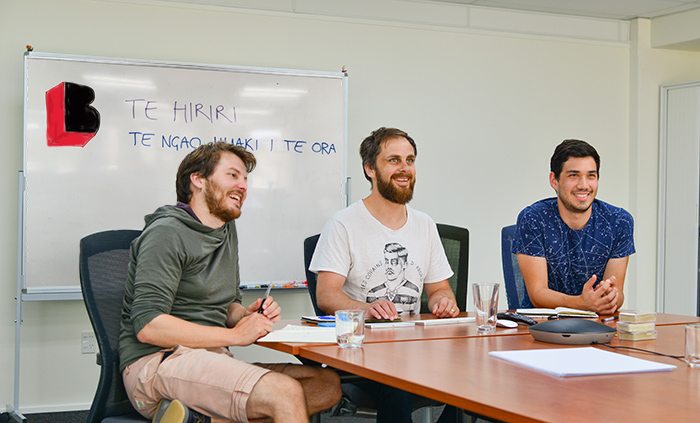
Research shows that using te reo in the workplace increases job satisfaction. So we’ve collected together a kete of resources, tools and tips to help you bring more te reo Māori into your mahi. Plus, we share examples of what we’re doing, and what we’ve learnt while doing it.
Research from the Auckland University of Technology (AUT) found that bringing te reo and tikanga Māori into the workplace “significantly enhanced” workplace mindfulness and job satisfaction. If you want to check it out, here’s the report (PDF).
For Boost, one benefit is that it helps us make New Zealand a better place. We build software and deliver Agile training, mainly for the NZ government. This means we’re often working with and for Māori. The better we understand te ao Māori, the better job we’ll do. And using the language will help us understand the culture.
Here’s a collection of factsheets, books, articles, online tools and apps to help you use te reo at work.
Te Reo o te Tari | Māori for the office (ZIP)
This PDF booklet of te reo phrases from Te Taura Whiri i te Reo Māori | Maori Language Commission is specifically designed for workplaces.
It includes a guidance on:
They also have lots of other great resources which you can filter by “workplace”.

Māori at Work by Scotty Morrison
The presenter of Te Karere and Marae and author of Māori Made Easy, Scotty Morrison has put together a one-stop shop for anyone wanting to use te reo in the workplace.
The book covers:
This is an easy-to-read guide to te ao Māori from an award-winning interpreter, teacher and advocate.
It includes:
100 Māori words every New Zealander should know
NZHistory put this collection together for their feature on Te Wiki o Te Reo Māori | Māori Language Week.
You can listen to each of the te reo words and phrases to learn how they’re pronounced, which comes in handy. Especially useful in the workplace are the:
Also handy is their word-a-day follow up: 365 useful words and phrases in te reo Māori
As you look to use more te reo at work, you’ll often want to find the Māori words for things. You’ll also come across te reo phrases you don’t yet know. Here are a few ways to get translations.
Based on the book Te Aka Māori-English, English-Māori Dictionary and Index, this dictionary includes quotes showing how the term is used and spoken examples to guide pronunciation.
More than just a dictionary, it’s also an encyclopedia, covering things like Māori names for institutions, places and other proper names, plants, animals, stars and planets, important Māori people, tribal groups and ancestral canoes.
As Te Ao | Māori News reported, Google translate is not always accurate, but it can be useful if you just need to get a sense, if not certainty, about how a word or phrase can be translated. Google translate is based on written reo not spoken and gives literal translations, not idiomatic ones.
Kupu is a free app that was developed in collaboration between Spark, AUT, Te Aka Māori Dictionary, Google and Colenso BBDO.
Want to find the Māori word for something in your workplace? Simply take a photo with your phone. You’ll get te reo terms for the things in your photo along with a guide to pronouncing them.
Sometimes you might want translations of technical terms that aren’t in any te reo dictionary. Or you might want the te reo phrases for concepts that are important to your organisation’s identity. To make sure you get them spot on, you may want to bring in a professional translator.
You can find translators through the translator’s register that Te Taura Whiri i te Reo Māori | Māori Language Commission provide.
According to the AUT research, the biggest barriers are a lack of Māori staff or knowledge about Māori culture and the fear of ‘getting it wrong’.
Here are some ways we’re working to get past these barriers at Boost. We:
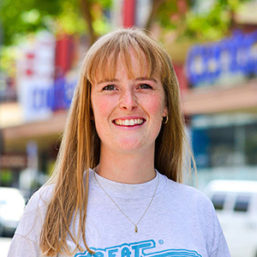
Let your team know that it’s about giving it a go, not about getting it right.
“I think it’s important to make it a safe space at work so we can just give it a try, as opposed to having to get it perfect,” says Boost Agile coach Mette Harker.
Help people step outside their comfort zone. Focus on the positives, cheer each other on, have fun.
This stops it becoming a whole big thing. Here are some ways to introduce te reo a bit at a time.
At Boost we do a kupu o te wiki. Each Monday we share a Māori word with a definition, a bit of background and an example of how you might use it.
We’re picking words we use a lot and which are key to the way we work. As an Agile workplace, we’re finding that Te Papa’s guide to Agile in te reo Māori has been super useful for this. Some terms we’re introducing to our kōrero include tū mai (stand-up), whakaputunga (the backlog), kua oti (done) and kanohi ki te kanohi (face to face).
If you want a simple way to regularly share te reo, you could subscribe to Kupu o te Rā — a reo word of the day service.

We’re also labelling bits of our office, starting with the whiteboards we use to track our projects. This gets the terms in front of us as we go about our day-to-day work.
Using reo for common interactions helps you do a little, a lot of the time. That’s why greetings are a great way to start.
If you don’t have anyone who knows the language inside your team, you can always get outside help. There are lots of people offering training in te reo and tikanga, both in person and online. They can be booked out, so you might need to contact them early.
For us, we didn’t really have to go outside our team. Rocky Webster has been incredibly helpful, running practical reo learning sessions focusing on how to pronounce te reo. Rocky’s one of our clients so he’s part of the Boost whanau.

“It’s been great working with Rocky on pronunciation,” said Boost developer Tom McCulloch. “It makes it much easier when you encounter a new word.”
We found that confidence rose after these sessions, so you might want to start with pronunciation. Here are a couple of guides to pronouncing te reo:
If you use te reo for the things that matter to your team, it can make it more relevant and meaningful.
For example, at Boost we recently got our values translated into te reo. We wanted to be able to talk about Boost in ways that resonate with tangata whenua. Our values give people a pretty good idea of how we roll because we came up with them by looking at how we actually work, not how we want to work.
One benefit of getting these translations is the way it broadens our understanding of te ao Māori. Our translator explained the background behind his translations, which helps set our values in a wider cultural context.
To give you a sense of how te reo illuminates te ao Māori, here is an explanation of each Boost value, its new translation and our translator’s commentary on how he came up with the reo version:

We have considered opinions but hold them lightly. We are at our best when we embrace constructive conflict and commit to being authentic and vulnerable. Feedback is a gift to give and receive, we lean into difficult conversations. Be brave and give it a go!
Commentary:
Derived from a proverb (‘e tū, whitia te hopo’). A ‘hopo’ is a barrier, or fear. ‘Whitia’ is the objective to cross that barrier, or overcome that fear. In this context, the hopo refers to conflict, feedback or criticism Boost aims to welcome and acknowledge, rather than dodge or parry away from.
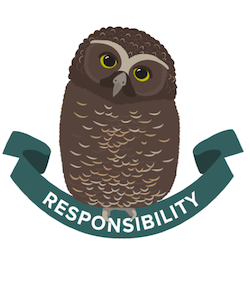
We have a responsibility to have an economically successful organisation to ensure stability and opportunities for team members, stakeholders and clients. We take responsibility for our customers’ outcomes. We are in charge of our own learning and sharing knowledge with the wider team.
Commentary:
There is no Māori word for responsibility as such. Instead, we consider responsibilities as things that must be carried at all times. For that reason, most people translate responsibility as literal things that are carried. In modern times, the word haepapa is used to add another layer of meaning, as a burden that is carried for ethical reasons. Hence it makes sense to use here.
The suffix -tanga is added here only to turn haepapa into a nominal noun. In this context, the English word responsibility is a nominal noun, so the suffix equates the two. It is also added to Manaaki for the fourth value (already translated), so it makes sense to keep that consistency.
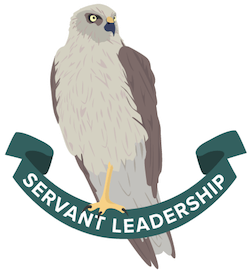
We are all leaders and at Boost all leaders serve. We are focussed on what we can do for others and developing our teams. We balance the needs of the individual with those of the organisation. We listen. We coach, we are humble and trusting. We value service not status.
Commentary:
This was a really interesting word to translate, because servant words in Māori aren’t all that kind. They’re mostly debasing. Therefore, I’ve departed from those entirely.
Rangatiratanga is a common word for leadership. I’ve used this here, and the nominal suffix -tanga is kept for the same reasons as haepapatanga (above).
For the word servant, I’ve opted for a metaphorical translation, manukura. In birdflight, the manukura is designated as the leading bird of the V-shape formation flocks take. That bird’s sole role is to reduce the wind impact taken on by other birds, to keep their energy levels up. After a time, the manukura will fall to the back (with the least wind resistance) and another will take its place. Birds that aren’t as strong in flight will stay in the middle and hover around there, as needed. In this manner, the birds collectively share the burden, and give rest where it’s needed. This seems to me to be a good translation for the idea that all leaders serve, and all are leaders.
Our last value needed no translation:
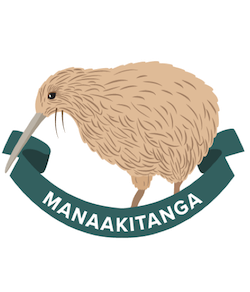
We make everyone feel welcome. We create an environment where everyone can be successful; we nurture relationships, raise others up and work to create and maintain safe spaces.
The definition of Manaakitanga in the Te Aka Māori dictionary is: hospitality, kindness, generosity, support — the process of showing respect, generosity and care for others.

While we’re just starting out on our journey, the great thing is we’re not doing it on our own.
“It’s been awesome how many people who’ve been willing to help us,” says Boost developer Daniela Lemow.
We hope you enjoy your own journey.
Haere pai atu, hoki pai mai!